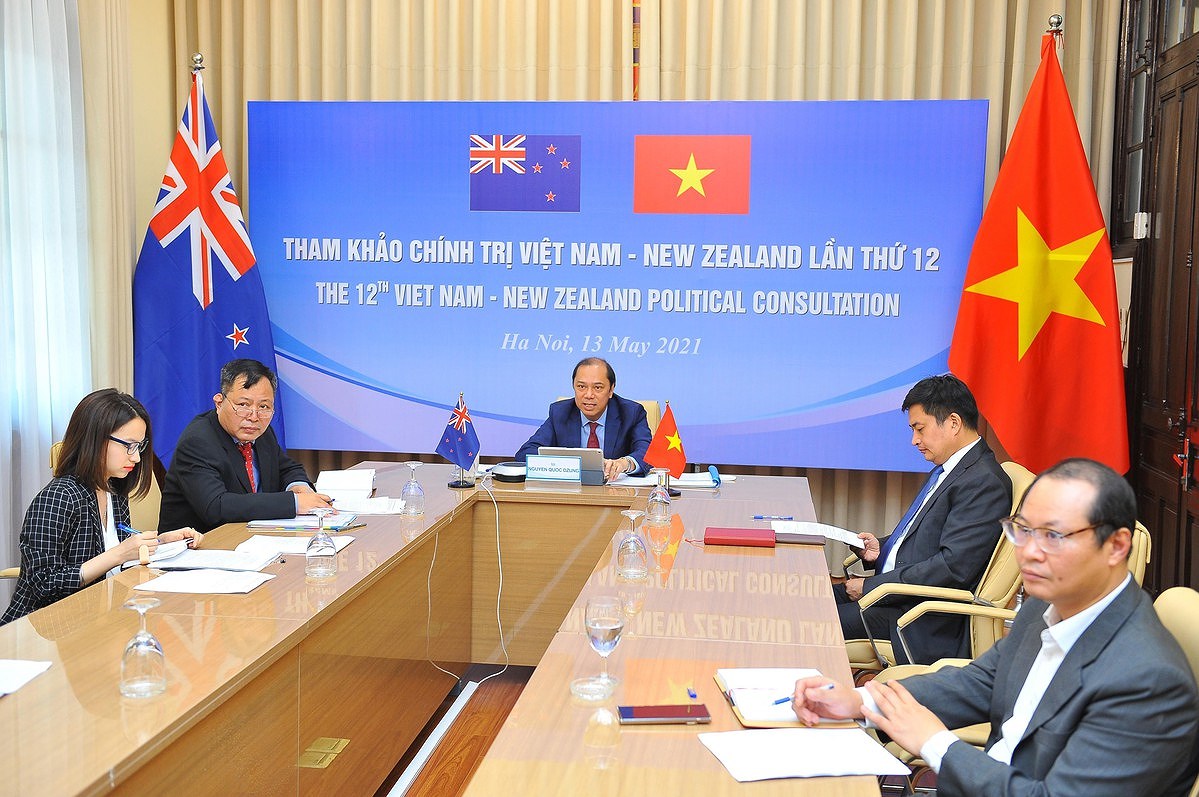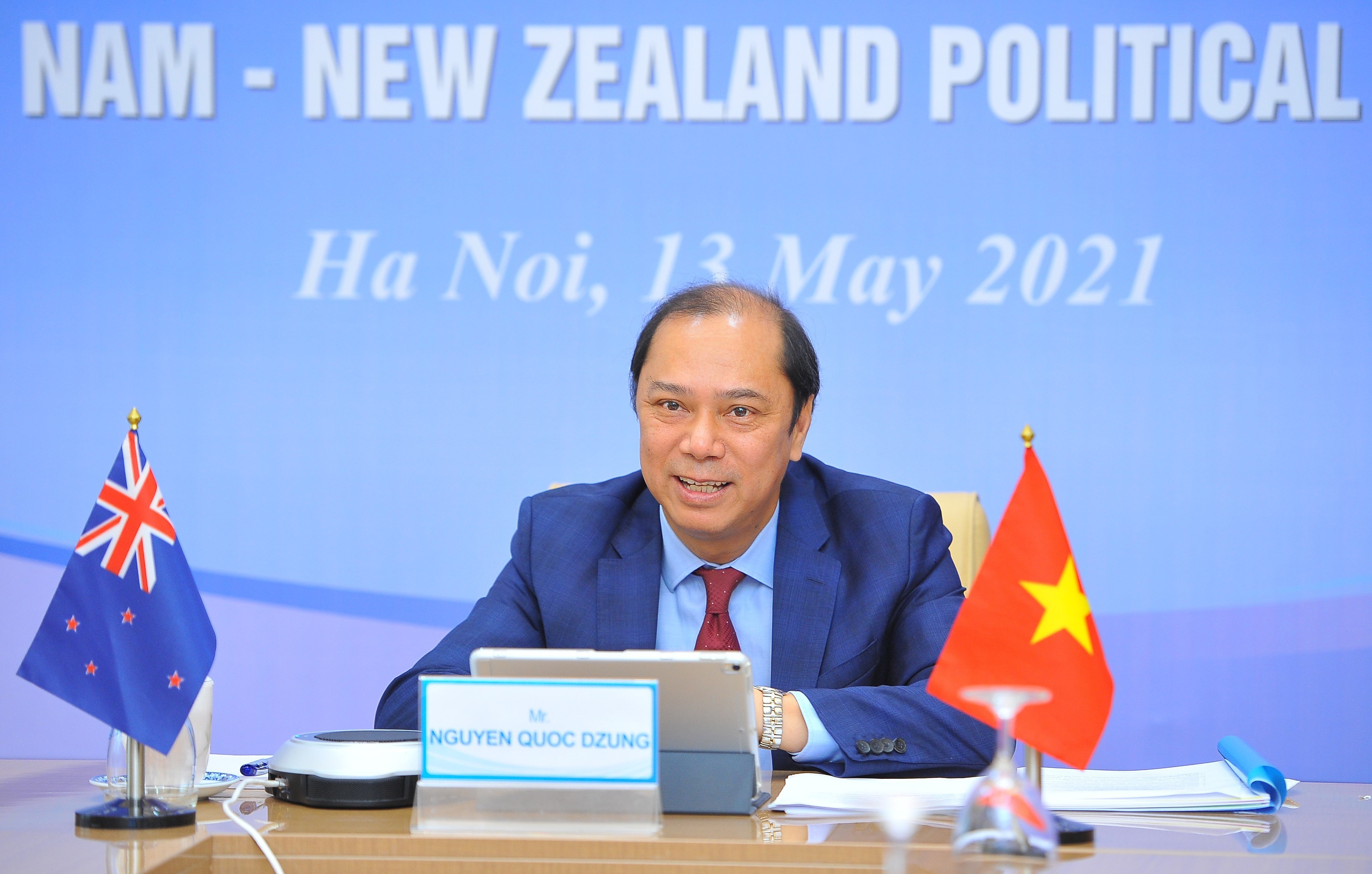 Deputy Minister of Foreign Affairs Nguyen Quoc Dung co-chairs the 12th Vietnam-New Zealand Political Consultation (Photo: VNA)
Deputy Minister of Foreign Affairs Nguyen Quoc Dung co-chairs the 12th Vietnam-New Zealand Political Consultation (Photo: VNA) - Vietnamese Deputy Minister of Foreign Affairs Nguyen Quoc Dung and Mark Sinclair, Acting Deputy Secretary for the Americas and Asia Group at New Zealand's Ministry of Foreign Affairs and Trade, co-chaired the 12th Vietnam-New Zealand Political Consultation via videoconference on May 13.
At the event, Sinclair congratulated Vietnam on successfully holding the 13th National Party Congress and curbing the spread of COVID-19, as well as the country’s achievements in economic recovery and assuming the ASEAN Chairmanship in 2020 and the United Nations Security Council (UNSC) Presidency last month.
In reply, Dung congratulated New Zealand on its accomplishments in socio-economic development and containment of the COVID-19 pandemic.
He spoke highly of New Zealand’s support for the Association of Southeast Asian Nations (ASEAN) in maintaining peace, stability and security, as well as safety and freedom of navigation and aviation in the East Sea.
Both sides agreed that Vietnam-New Zealand relations have been flourishing and affirmed the significant role of the two foreign ministries in the bilateral ties.
The holding of the virtual 12th political consultation demonstrated the flexibility and determination to maintain the sound relationship between the two ministries and the two nations in general, they said.
They discussed measures to promote the bilateral relationship, and agreed to devise and sign a plan of action on the implementation of the strategic partnership this year, as well as strengthen political and diplomatic ties by increasing meetings and visits at all levels via all channels.
 Deputy Minister of Foreign Affairs Nguyen Quoc Dung (Photo: VNA)
Deputy Minister of Foreign Affairs Nguyen Quoc Dung (Photo: VNA)
The two countries will regularly maintain and capitalise on the efficiency of existing bilateral cooperation mechanisms, including the joint commission for trade and economic cooperation, political consultations between the foreign ministries, official development assistance, and security and national defence cooperation, among others.
The two sides agreed to foster cooperative ties in transnational crime prevention, education and training based on the implementation of the 2020-2023 strategic cooperation plan on education, people-to-people and art exchanges, and ecotourism development when conditions permit.
During the meeting, the two sides committed to closely working together and supporting each other at regional and international forums like the UN, ASEAN and the Asia-Pacific Economic Cooperation (APEC) forum, and carrying out commitments in the Comprehensive and Progressive Agreement for Trans-Pacific Partnership (CPTPP).
They also agreed to accelerate the ratification of the Regional Comprehensive Economic Partnership (RCEP) agreement and integrate the Greater Mekong Subregion development with the building of the ASEAN Community.
The two sides exchanged views on regional and international issues of mutual concern and complicated developments in the East Sea, and underlined the importance of maintaining peace and stability in the East Sea and resolving disputes through peaceful measures in line with international law, including the 1982 UN Convention on the Law of the Sea (UNCLOS).
They pledged to support the full and effective implementation of the Declaration on the Conduct of Parties in the East Sea (DOC) and negotiations between ASEAN and China to reach a practical, effective and efficient Code of Conduct in the East Sea (COC) in line with international law./.